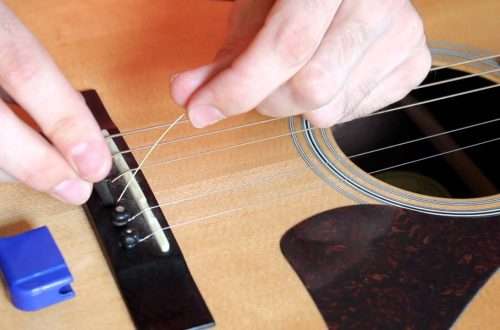
7 mistakes guitarists make and how to avoid them
Contents

There is a common belief in our culture that musical skills are innate. You appear in this world happily gifted with talent, hearing, magic fingers, etc., or you will live with the feeling that it is impossible to realize your dreams. It is said that it is inappropriate to question cultural dogmas, but what if, while experiencing the mentality of a different latitude, you find out that someone may think differently?
Let’s take an example Jamaicawhere I was recording the album and touring. After a few days, I had no objection to the fact that this country lives to the rhythm of music. Everyone sang, from the taxi driver to the cook to the tourist guide. Were each of them a Bob Marley genius? Not. Did everyone believe in their abilities and toyed with the process? Guess. The truth is, playing an instrument is a skill like any other. You can (and should) develop and nurture it. I am not saying here that everyone is born a genius aspiring to live up to Hendrix or Clapton or anyone else. However, I believe that we can develop at our own pace, while having a lot of joy in performing and creating music.
I met many times with guitarists who, despite many years of experience, had knowledge and skills at the level of my students after several months of teaching. A brief conversation always revealed reasons, most of which were repeated regularly among different cases. Here are the most common of them.
1. SELF-BUILDING BY CHOICE
If you have the ability to design a good curriculum and to supervise yourself, then it’s great when you implement it – do it. However, remember that you are responsible for your own results, frustration, stress and time lost. You will achieve your goals much easier and faster with a great teacher whose strategy has proven itself many times over. The electric guitar is a relatively young instrument. Many, known today, guitarists learned on their own, because teachers simply weren’t in the world. Nobody showed how to play rock, jazz or blues. It is different today. There are many good teachers whose services you can use. Not only will you achieve your goals faster, you will also have fun doing it.
Some guitarists show off being self-taught, trying to impress. The fact is, however, that what counts in the final analysis is musical skills, not eloquence.
Find a good teacher now.

2. INEFFECTIVE LESSONS
The guitar teacher is a profession that is not subject to any controls. You don’t need any qualifications or specialized education to deal with it. Many musicians take up giving lessons, seeing it as an easy and quick way to earn money. Most often they operate without a plan and an idea, and therefore are simply ineffective. They cost you the most both because of money and time. Remember that great guitar skills do not necessarily translate into transferring knowledge. Taking musical advice from colleagues, family or inexperienced teachers not only doesn’t help, but can even set you back in development. Be careful about accepting advice from people who have not proven their competence in the field.
Give up lessons if they don’t work, despite the work you put in. But talk to the teacher about this first.
3. CRUSHING WITH THE AMOUNT OF MATERIAL
Feeling overwhelmed is a common problem that affects every musician sooner or later. It is especially popular with beginner and intermediate guitarists. Overwhelming is caused by taking too much knowledge and not being able to put it into practice. Many guitarists believe that the more knowledge and theory they acquire in a short time, the better musicians they will be. In general, however, the opposite is true.
To avoid this problem, break down knowledge into small chunks and make sure you put it into practice before proceeding.
4. LEARNING THE WRONG THINGS
Learning a new topic should take place in the correct order. First, you acquire knowledge in the correct form and quantity. Then you clear your doubts, practice it, and then learn the application and integration with other skills. Each of these stages is critical and NECESSARY no matter what level you are currently at. I have observed many times when a student gained a momentary boost of self-confidence and tried to jump over several rungs of the ladder at a time. The result was not only a misunderstanding of the topic, but most of all the lack of the ability to use knowledge in practice.
To avoid this problem, stick to the teacher’s recommendations or, if you are learning alone (see point XNUMX), try to stay within certain limits, focusing on one thing at a time.

5. IGNORE PROBLEMS
Do you have a problem with the right hand technique? What about the left one? Can you smoothly pull offs and hammer ons? Or maybe your other guitar skills aren’t your best? If so, what do you do with it? Too often we ignore problems with our technique, especially those that seem small and insignificant. Meanwhile, it is on them that the great change is built.
Whatever you have a problem with – define and isolate it first. Then, while playing very slowly, analyze what you are doing wrong. Start implementing the corrected movements, gradually increasing your pace.
6. NO CLEARLY DEFINED PURPOSE
Having a clear, positively worded, achievable, and measurable goal is essential if you want to become a great guitarist. Meanwhile, many people are not aware of it at all. When they start learning, they usually just want to play a few songs and… that’s fine. However, these goals must change over time.
Set goals, but remember that they are not permanent and must change as you develop your skills and musical awareness. Think about them, write them down and start implementing them.
7. FOCUS ON WRONG THINGS
It’s amazing how many people learn things that have nothing to do with their dream goals. It is a waste of time to develop areas of technology that you are not going to use. For example, if you want to be a heavy metal guitarist, learning finger picking will not be the best solution for you. Obviously it’s very good to know different techniques, but ALWAYS pursue your main goals first. There will be time for other things.
Think about what is holding you back and what you can do to start moving closer to your goal.
Do the above problems sound familiar? If so, don’t worry, I have had to face each of them myself more than once. Consciousness alone puts you in a better position than hundreds of other musicians in a similar position. But now the most important thing is to act. Anthony Robbins – a leading figure in the world of self-development – used to say that once you define your goals, the first step should be taken right away. So get to work! Pick one item that you will work on today and be sure to report on how it went. Good luck!





